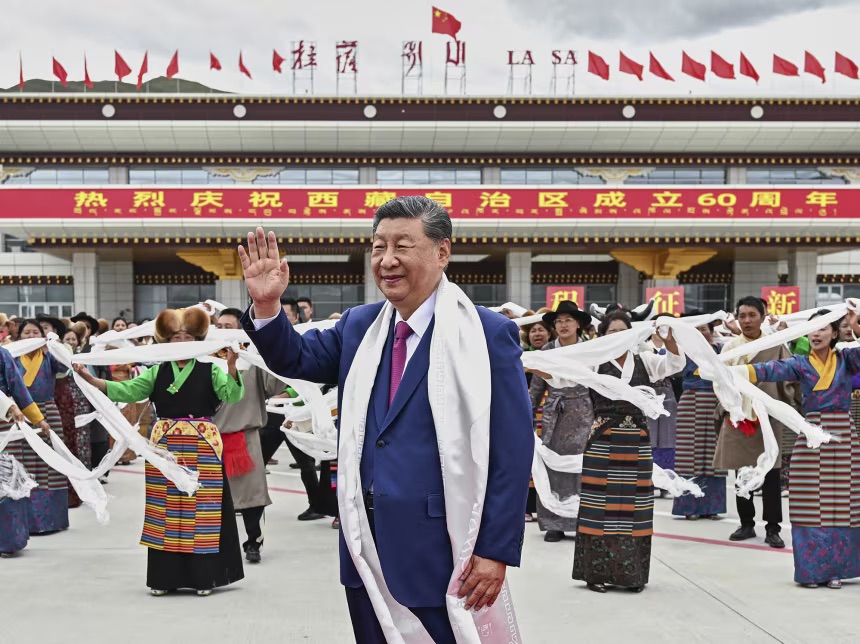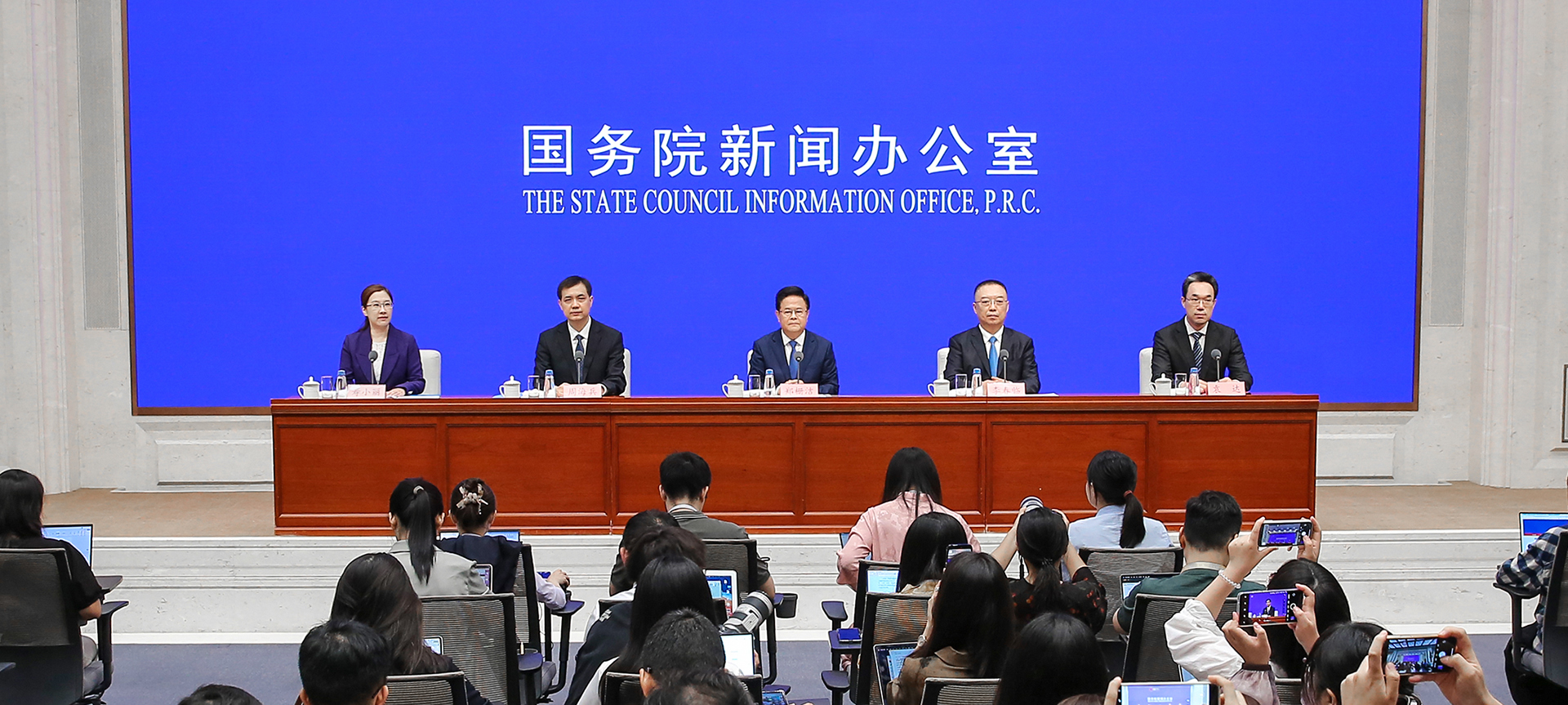
Part I: Diplomacy with Chinese Characteristics: PRC Consulate Gray Zone ‘Pop-up’ Events in New York and Beyond
Part I: Diplomacy with Chinese Characteristics: PRC Consulate Gray Zone ‘Pop-up’ Events in New York and Beyond
Executive Summary
- The Consulates General of the People’s Republic of China (PRC) in New York, San Francisco, and Chicago have been conducting gray zone “pop-up” consular service events across the United States under the initiative “Bringing Consular Services into the Community,” often at non-diplomatic facilities. These events provide consular services such as passport renewals and document processing, but their legality remains questionable due to possible violations of international law.
- Beyond offering basic services, these events likely serve as platforms for the PRC’s broader political influence operations, potentially gathering intelligence on Chinese diaspora communities and mobilizing them for future operations, including political activities. The events have been co-hosted by community organizations with links to the CCP’s united front system, raising concerns about data handling and surveillance.
- The events may also align with the PRC’s broader strategy of influence and electoral interference in the United States, targeting districts with substantial Chinese American populations and potentially mobilizing community support for specific candidates and political agendas.
Editor’s note: This article is the first in a two-part series. The second part appears in the subsequent issue of China Brief. You can also read a combined version of the article at the PDF at the bottom of this page, or at the link here.
Consulates General of the People’s Republic of China (PRC) in New York, San Francisco, and Chicago have been organizing a series of gray zone events providing consular services in the form of “pop-ups” at non-designated diplomatic facilities across the United States. [1] Under an initiative referred to as “Bringing Consular Services into the Community (领事服务进社区),” these events typically last anywhere from a few hours to a full day and offer services such as passport renewal and the issuing of travel documents to PRC citizens. Over 90 have been hosted across the country, with more than 80 organized by the New York consulate, which has run events in 15 cities across seven states since 2016. The venues for these events are wide-ranging. Some have taken place in clubhouses, university classrooms, and elderly centers, while others have been hosted in the offices of community associations. Even shopping malls and restaurants have been used to provide consular services. [2]
The legality of the pop-ups is unclear. Since the venues for these events are not located at designated facilities that enjoy extraterritorial protections for providing consular services, the PRC would likely have to have received the consent of the US Government to conduct them. If they were not accredited by the host country, Beijing is likely violating international law. [3] Even if these events have been authorized by the US Government, the evidence suggests that they have exceeded the remit of providing consular services by also providing platforms for political activities. It is also possible that these events have enabled the PRC to conduct influence operations (IOs) and lay the groundwork for electoral influence and other activities while strengthening their capacity for overseas political mobilization.
Figure 1: The distribution map of the locations of pop-up events from 2016 to 2024. This map only includes events organized by the PRC Consulate General in New York.
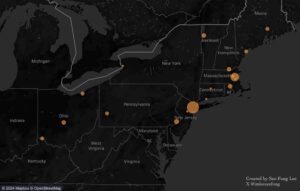
(Source: Author)
These apparently innocuous events can be seen as part of a broader strategy by the PRC that uses gray zone tactics to disrupt existing diplomatic and legal practices and create new norms. The increase in frequency of events under this consular initiative indicates a gradual institutionalization and intensification of the PRC’s preexisting extraterritorial law enforcement efforts. Like other gray zone operations conducted by the PRC, these consular services events challenge the international rules-based order but do so under the threshold that would provoke major diplomatic retaliation. This is crucial to the PRC’s hybrid warfare strategies.
Eight Years of Community Penetration
In the United States, there are five recognized traditional PRC foreign missions. These are the PRC Embassy, located in Washington, DC, and four recognized consulates in New York, Chicago, San Francisco, and Los Angeles (US Department of State, May 21, 2021). Over the last eight years, the PRC’s consulates have made efforts to engage with local Chinese diaspora communities under an initiative called “Bringing Consular Services into the Community (领事服务进社区).”
The New York Consulate General has apparently been a pioneer of these pop-up events. In 2024 alone, it has hosted at least 27 events in various parts of New York City, Boston (Massachusetts), Philadelphia and Pittsburgh (Pennsylvania), Cleveland and Cincinnati (Ohio), Pawtucket (Rhode Island), and Metuchen and Cedar Knolls (New Jersey) (see Appendix, Table 1). The events themselves have taken place in venues that range from clubhouses, university classrooms, and elderly centers, to associations’ offices, shopping malls, and restaurants. The first pop-up event in 2024 took place at an adult day care center in Flushing, New York, on March 12. At the session, PRC Consul General Huang Ping (黄屏), and his deputy Wu Xiaoming (吴晓明), personally processed passport applications, renewals, and “overseas residents pension qualification verifications” for overseas Chinese (PRC Consulate General in New York; March 6, March 12). From April 15–20, 2024, Deputy Consul General Wu Xiaoming (吴晓明) also led a working group from the New York consulate that hosted four sessions providing consular services for PRC nationals. These took place in New York, Ohio (2 days), and Pennsylvania. The events took place in a University classroom, the Union Center Pavilion, a retirement home, and a Chinese restaurant, respectively (PRC Consulate General in New York, April 9).
The initiative “Bringing Consular Services into the Community” under which these events have taken place appears to date back as early as January 2016. The official name of the first documented “consular service” event was “Bringing Services to the Overseas Chinese Association (送服务进侨团).” During that event, former PRC Consul General in New York Zhang Qiyue (章启月) led a team in Brooklyn providing on-site services for overseas Chinese. These included pension audit verification applications, and both consultations on and applications for passports and visas (WeChat/PRC Consulate General in New York, January 25, 2016). In February 2017, the New York consulate launched “consular services month.” Spanning February 7–April 8, this involved a series of 30 “Bringing Consular Services into the Community” events organized with the help of 19 “overseas Chinese cooperation associations (合作侨团)” and over 300 “volunteers (志愿者)” (WeChat/PRC Consulate General in New York, April 21, 2017).
The success of these early events has led the consulate to host pop-up events with more regularity. As it has done so, the scope of the services provided has expanded. Now, beyond services catering to retired PRC citizens such as the “overseas residents pension qualification verification” application, more formal consular services such as passport renewal and the issuing of travel documents are also offered to PRC nationals more generally. The services have also expanded in scale, taking place across a number of different states within the New York consulate’s consular district (PRC Embassy to the United States, June 29).
Figure 2: Deputy Consulate General Wu Xiaoming at the consular service pop-up event in a classroom in Capen Hall at the State University of New York at Buffalo on April 20.
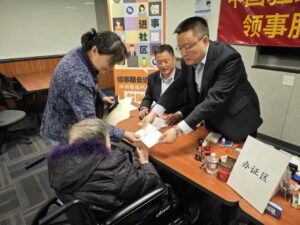
(Source: PRC Consulate General in New York, April 22)
Pop-Ups Align with Party Policies
The motivations for the initiative can be traced back to Party documents and high-level speeches. This includes directives found in the work reports CCP Chairman Xi Jinping delivered to the 19th and 20th Party Congresses that have sought to enhance the well-being of and strengthen ties with overseas Chinese communities (Xinhua, October 27, 2017; Gov.cn, October 25, 2022). The initiative is also a manifestation of the concept of “people-centered diplomacy (外交为民)” (PRC Consulate-General in Chicago, March 3, 2017; Xinhua, December 9, 2023). As articulated by Xi, people-centered diplomacy entails “actively expanding the work of overseas Chinese affairs,” “safeguarding the security, legitimate rights, and interests of overseas Chinese,” and making Chinese citizens “feel the strength and the warmth of their motherland, as well the dignity and honor of being Chinese (让中国公民在世界各地都能感受到祖国的力量与温暖,感受到中国人的尊严与荣耀)” no matter where they are (People’s Daily, December 30, 2023; China’s Diplomacy in the New Era, accessed July 9).
In addition to PRC consulates, the main bodies tasked with executing the initiative are associations and “volunteers” affiliated with the United Front Work Department (UFWD) and the All-China Federation of Returned Overseas Chinese (ACFROC)—organizations that are central to CCP strategies targeting the Chinese diaspora. [4] According to Party literature, united front strategies include “using the legal to mask the illegal (利用合法掩护非法,合法与非法巧妙结合)” and other principles such as building networks for “nestling intelligence within the united front (寓情报于统战中)” and “using the united front to drive intelligence (以统战带动情报)” (People’s Daily, November 18, 2020).
It follows from this that PRC officials and affiliated organizations may be using the pop-up events for more than their explicit function of providing consular services. Namely, the events could serve as cover for expanded influence operations (IOs) within Chinese American communities. For the PRC, pop-ups offer several benefits. By actively going into local communities, the consulates can reach many more people than they would by only providing services within their designated consular offices. This is especially the case for people who might hesitate to visit a consulate due to the prospect of long-distance travel or the non-urgent status of renewing documentation (if, for instance, that person has no plans to travel overseas). The pop-ups also seem to fly under the radar of local law enforcement, which allows them to operate with relative freedom. They are cost-effective, too, as they leverage the capacity of the consulates’ cohosts, which are usually CCP-affiliated organizations. Cohosting with community organizations also provides the PRC with direct access into the communities themselves.
There are several ways in which these pop-ups might provide opportunities for gathering intelligence on diaspora communities in the United States. An explicit feature of the events is to process documents and applications for documents for PRC citizens. The extensive reach into local communities that they provide enables the PRC government to gather personal data and information on overseas citizens much more effectively than do other events, such as gatherings or rallies organized by overseas Chinese cooperation associations or cultural and business organizations. Personal information might include people’s immigration status—for instance, what visa they might be on, whether they are permanent residents, or if they are American citizens. This information is useful to the PRC, as it can be used, among other things, to identify citizens for possible future operations such as election interference activities. Cohosting events with community organizations raises the possibility of mishandling private information. At the consular services events, members of associations act as “volunteers” whose responsibilities include “helping to fill out forms” that include applicants’ personal information. In some instances, applicants are required to pick up their approved or completed forms at these associations’ addresses at a later date (WeChat/PRC Consulate General in New York, March 15, 2019). This unusual approach to the handling of personal data opens the door to intelligence gathering and the surveillance of former PRC residents. This could advance Beijing’s broader transnational repression and repatriation campaigns, as has been noted in the case of the PRC’s overseas police stations (Canada National Security and Intelligence Committee of Parliamentarians, June 3).
Figure 3: A consular service pop-up event at a Chinese restaurant in New York on Feb 23, 2017
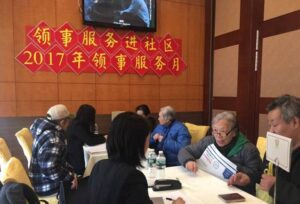
(Source: PRC Consulate General in New York, February 24, 2017)
Figure 4: A consular service pop-up event at a shopping mall in Ohio on March 15, 2017
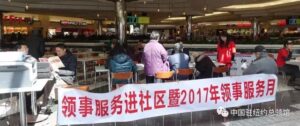
The pop-ups could also provide an avenue for the PRC to shape the domestic politics of the United States in ways that align with its own interests. Cross-referencing the precise addresses of nearly all of the pop-ups with electoral district maps indicates two things. First, pop-ups tend to occur in constituencies that are home to substantial Chinese American populations. Second, they tend to occur in separate constituencies. For instance, of the 11 sessions hosted in New York State between March and July 2024, most were hosted in distinct congressional, senate, and assembly districts. The only exception was the city’s Chinatown, a constituency with a large Chinese American population, where three of the events were hosted. This suggests that the pop-ups could provide a basis for mobilizing people to support specific candidates running for seats at various levels of government (See Appendix, Table 2).
Pop-up Cohosts’ Links to the Party-State
The consulates general usually cohost pop-up events alongside local community organizations. The Fujian Association In USA (美国福建会馆), for instance, often provides support for the New York consulate’s events. According to an announcement by the consulate, an event on May 9 was hosted at the association’s address, though the name of the association itself was not included (PRC Consulate General in New York, May 1). [3] The involvement of this association’s members can be confirmed, however, by identifying them in photos from the event (World Journal, May 14; The USA Hall of Fame, May 14).
Many of these organizations already have links to the united front system. The Fujian Association In USA allegedly has ties with the Fujian Province Federation of Returned Overseas Chinese (福建省归国华侨联合会), a provincial-level branch of ACFROC. The association’s president, Chen Zhao-yin (陈昭银), led a delegation to visit municipal-level ACFROC in Fuzhou in April 2023 where they met with Lin Gaoxing (林高星), a PRC official who is also the chairman of the Fuzhou Federation of Returned Overseas Chinese (Chinaqw, April 20, 2023). [5]
Organizations that have participated in the pop-ups have also engaged in election-related activities in the United States. For example, on March 22, 2023, the New York-based American Association of Cantonese (纽约广府人总会) co-hosted a session endorsing Susan Zhuang (庄文怡), a city council candidate for Brooklyn’s 43rd District. At the event—one of two held in early 2023 for this purpose—the organizers claimed that they would be “sending a team of volunteers to help her win the final victory (将派出义工团助选她赢得 … 最终胜利)” in the election (US China Press, July 31, 2023). The association, as well as its president Luo Shaoling (罗少领), appears to have a close relationship with entities affiliated with the PRC Party-state. In November 2023, the group led a delegation to meet with Li Feng (李丰), the chairman and Party secretary of the Guangdong Federation of Returned Overseas Chinese, a CCP organization that is part of the united front system (Guangdong Province Federation of Returned Overseas Chinese, November 23, 2023).
These organizations have also engaged in other activities that align with the interests of the CCP and the objectives of the united front. In August 2023, for instance, the Fujian Association In USA organized a protest against the visit of the then-Vice President of Taiwan Lai Ching-te (賴清德) to New York (US China Press, August 14, 2023).
Figure 5: Consular service pop-up event at the Fujian Association in USA in New York on May 9

Other organizations that participate in the pop-ups are affiliated with Beijing’s Ministry of Public Security (MPS). For example, the US Department of Justice (DOJ) in April 2023 charged two men with “conspiring to act as agents of the PRC government as well as obstructing justice by destroying evidence of their communications with an MPS official” (US Department of Justice, April 17, 2023). One of the men, Lu Jian-wang (卢建旺), is co-president of the Fukien Benevolent Association of America (福建同乡会). According to the DOJ’s press release, Lu was acting under the direction and control of the MPS official and helped open and operate the first known overseas police station in the United States on behalf of the Fuzhou branch of the MPS. On March 12, 2024, long after the charges were made, the Fukien Benevolent Association of America participated in a “Bringing Consular Services into the Community” event organized by the New York consulate.
Figure 6: The Fujian Association in USA (美国福建会馆) participates in a counterprotest against the visit of the then-Vice President of Taiwan Lai Ching-Te to New York on August 13, 2023
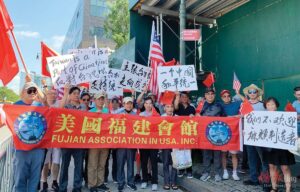
(Source: US China Press, August 14, 2023)
Conclusion
The PRC’s consulates general in the United States have, for at least eight years, run pop-up events across the country that appear to contravene either international law, US domestic law, or both. It is unclear whether the consulates have received approval from the US Department of State to run these events. Even if they have done so, any authorization would strictly be limited to the provision of consular services. It appears, however, that the pop-up events, which tend to be co-hosted with organizations with links to the CCP and its united front system, have also served political purposes.
These irregular activities may serve as peacetime united front operations to advance overseas political mobilization capabilities. While the effectiveness of the events as opportunities for intelligence gathering is unclear, these pop-up events enable the PRC to strengthen ties with overseas Chinese communities. In doing so, they can explore approaches to better coordinate and mobilize for future operations—including kinetic operations—all in the name of “diplomacy for the people.”
Notes
[1] A note on methodology. This report leverages Open-Source Intelligence techniques (OSINT), examining publicly available data from websites and social media platforms collected between January 1, 2016, and September 7, 2024. A combination of social media monitoring and off-the-shelf tools were used to collect publicly available data for the case studies. This timeframe was selected to capture the most relevant case studies since the launch of the initiative. Analysis of the collected data identifies strategies deployed, trends and patterns, and attributions of the influence operations.
[2] The full list of events organized by the PRC Consulates General in New York, San Francisco, Chicago, and more from 2016 to 2024 may be shared upon request to the author.
[3] The Vienna Convention on Consular Relations states that “the prior express consent of the receiving State shall also be required for the opening of an office forming part of an existing consular post elsewhere than at the seat thereof” (International Law Commission, 2005).
[4] ACFROC is the principal united front organization that is tasked with influencing ethnic Chinese overseas. See Joske, Alex. (2020). “The party speaks for you: Foreign interference and the Chinese Communist Party’s united front system.” Australian Strategic Policy Institute. Available at: https://www.aspi.org.au/report/party-speaks-you.
[5] Lin appears to be also the former Deputy Director of the Fuzhou Municipal Bureau of the Ministry of Industry and Information Technology (福州市工业和信息化局副局长) and Deputy County Mayor of the Luoyuan County People’s Government (罗源县人民政府副县长). PRC official sources do not provide photos of him, so we have not been able to confirm that this is the same person (Fuzhou Government, July 24, 2014; September 3, 2021).
Appendix
Table 1: List of Venues for Events organized by the PRC Consulate General in New York, 2024
| Date & Time | State | City | Address/ Entity | Venue Type |
| September 7 | New Hampshire | Nashua | 295 Daniel Webster Hwy | Unknown |
| September 1 | Vermont | Burlington | Zen Garden (御园) | Chinese restaurant |
| August 30 | Maine | Bangor | Bangor Chinese School (中国语言文化中心) | Association/ Organization |
| July 13 | New York | New York | Jiayi Elderly Center (嘉怡老人中心园) | Elderly Center |
| May 26 | Massachusetts | Boston | 152 Arlington St. | Unknown |
| May 25 | Massachusetts | Boston | Greater Boston Chinese Golden Age Center (贝尔蒙特老年活动中心) | Elderly Center |
| May 18 | New York | New York (Staten Island) | 1727 Richmond Rd | Unknown |
| May 11 | New York | New York | Orange County Chinese Association (OCCA) (橙郡华人协会) | Association/ Organization |
| May 9 | New York | New York | Fujian Association in USA (美国福建会馆) | Association/ Organization |
| May 8 | New York | New York | San Kiang Charitable Association (纽约三慈善会所) | Association/ Organization |
| April 24 | New York | New York | Chinatown East Broadway Mall (唐人街新怡东商场) | Shopping Mall |
| April 21 | New Jersey | Cedar Knolls | Cedar Knolls Adult Medical Day Center (雪松中心) | Adult Medical Day Center |
| April 20 | New Jersey | Metuchen | Mandarin Academy of Metuchen | School/ University |
| April 20 | New York | Buffalo | The State University of New York at Buffalo (纽约州立大学布法罗分校) | School/ University |
| April 18 | Pennsylvania | Pittsburgh | Szechuan Spice (蜀香园餐厅) | Chinese restaurant |
| April 17 | Ohio | Cleveland | St. Clair Place (老年公寓) | Senior Apartment |
| April 15 | Ohio | Cincinnati | Union Center Pavilion | Union Center Pavilion |
| April 14 | Connecticut | West Hartford | Solomon Schechter Day School | School/ University |
| April 14 | Connecticut | Milford | Wudang Kungfu Academy | Association/ Clubhouse |
| April 13 | Rhode Island | Pawtucket | Rhode Island Association of Chinese Americans (罗德岛华人协会会所) | Association/ Clubhouse |
| April 07 | Massachusetts | Boston | Chinese Progressive Association (波士顿华人前进会会所园) | Association/ Organization |
| April 06 | Massachusetts | Boston | Wong’s Family Association in Boston (波士顿黄氏宗亲会所) | Association/ Organization |
| March 29 | New York | New York | Health Essential Association(华人健康协会) | Association/ Organization |
| March 25 | Pennsylvania | Philadelphia | Friends Senior Care Center (费城华埠好朋友老人活动中心) |
Elderly Center |
| March 14 | New York | New York | Songbai Building (松柏大厦) |
/ |
| March 13 | New York | New York | Da Pingguo Senior Center (大苹果老人中心) | Elderly Center |
| March 12 | New York | New York | Da Diguo Adult Care Center (法拉盛大帝国成人日间活动中心) | Adult Day Care Center |
(Source: Author research)
Table 2: Locations of pop-up events in New York State, 2024
| Date | Venue | Congressional District | Senate District | Assembly District |
| July 13 | Jiayi Elderly Center (嘉怡老人中心) | 10 | 17 | 49 |
| May 18 | 1727 Richmond Rd, Staten Island | 11 | 24 | 64 |
| May 11 | Orange County Chinese Association (OCCA) (橙郡华人协会) | 18 | 42 | 98 |
| May 9 | Fujian Association in USA (美国福建会馆) | 6 | 16 | 40 |
| May 8 | San Kiang Charitable Association (纽约三江慈善公所会所) | 10 | 27 | 65 |
| April 24 | Chinatown East Broadway Mall (唐人街新怡东商场) | 10 | 27 | 65 |
| April 20 | State University of New York at Buffalo (纽约州立大学布法罗分校) | 26 | 61 | 146 |
| March 29 | Health Essential Association (华人健康学会) | 11 | 17 | 47 |
| March 14 | Songbai Buiding (松柏大厦) | 10 | 27 | 65 |
| March 13 | Da Pingguo Senior Center (大苹果老人中心) | 10 | 22 | 49 |
| March 12 | Da Diguo Adult Care Center | 6 | 16 | 25 |
(Source: NYS Elected official District 2022, Accessed Sept 19)

